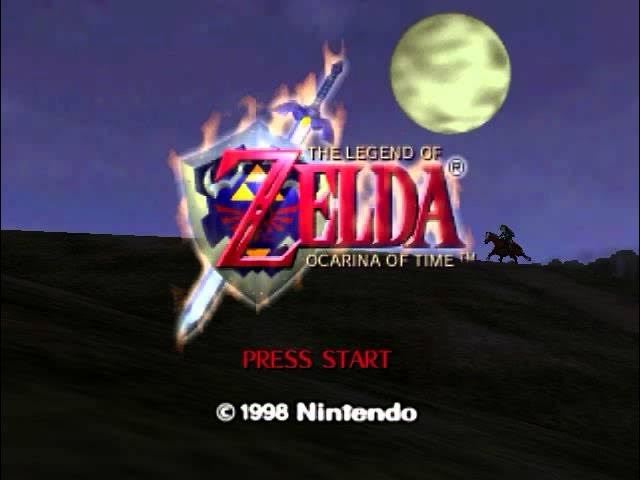It’s actually the sounds of Epona that make this piece perfect. Or the lack thereof. It’s the differences between the in-game feeling I get from this piece and the way it makes me feel when I put it on in my car or when going to bed that makes this the initial point of discussion from the game that first made me appreciate the music in my games.
Putting it on outside of the game, with no sound effects, no galloping or whinny, still calls to mind the bottomless, tempestuous oceans of nostalgia that only a game like Ocarina of Time can contain. But as if you could actually go back to the first time you started Ocarina of Time, as if you have never played Ocarina of Time, have no concept of these places Link is riding by — hell, if you were around at the time, you may even be able to vouch for how it felt to see Link in 3D for the first time on your own television — the accompanying theme is an excellent calm before the storm. The sense of adventure imbued by seeing Link take his solitary ride across Hyrule at dawn, ready to face the next day of his journey, is contrasted by the subdued pace and somber melody. Epona’s footfalls echo in your mind as you take in the landscape and wonder what awaits you in each of these places: the smoke-ringed peak of Death Mountain, the rolling hills of Hyrule Field, the impenetrable white walls of Castle Town.
I tend to think that Link needs these early morning rides, right as the sun comes up and the threat of constant Poe and Stalchild scuffles aren’t there to break his concentration. Alone all his life, the boy without a fairy, the man without an adolescence, Link in Ocarina of Time probably finds comfort in the isolation, in the quiet. The only companion he has is the one he’s been able to call upon since early on in this quest — Epona. Stopping to drink from Zora’s River, Epona rears back and whinnies to signal that she’s ready to go, and they’re off again, as you should be, with the track and opening sequence nearly finished, the sun beginning to peek over the horizon onto the open field, and the need to press start and head to the file screen imminent.
And then I think about this piece with all the memories it has behind it. Playing it as a teenager and realizing that was over half my life ago. Thinking that being, what, 14? 15? That that was no longer the innocent part of my life? What I wouldn’t give to have another chance at 15, just like I’d give anything to experience Ocarina of Time, or Shadow of the Colossus, or Super Mario Galaxy for the first time.
But more than that, what if we got to do all our formative experiences again? To learn to drive, to work our first job, to get up and go to high school again, even if it’s hard. Because the beauty of it is that all of those experiences mattered. Ocarina of Time is my adolescence, and if it’s not yours, think of what it might be. This piece is the soundtrack to that part of your life, and it’s the sound of a part of life that Link never got to have. The serene accompaniment of piano and ocarina to the sun rising into a new day, in a world so much worse for wear than it could possibly ever appear in the first light of dawn — this is what nostalgia sounds like. And I use that word with as much weight as it can possibly still muster, in spite of the weight of my entire generation leaning upon it with each passing day.
The title theme of Ocarina of Time, in all seriousness and self awareness: the score to my nostalgia.
